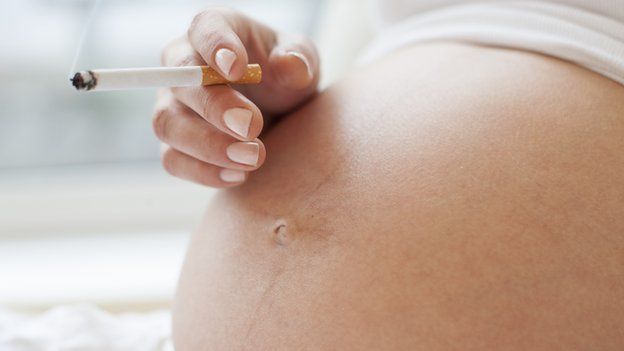Regional divide in smoking in pregnancy
- Published

Campaigners say there are big regional differences in the proportion of women smoking during pregnancy, with rates much higher in poorer areas.
NHS data shows 27.2% of mothers-to-be in Blackpool smoke throughout pregnancy compared with 2.1% in Westminster.
And, each year, more than 70,000 pregnancies are affected by smoking.
The overall rate has fallen to below 11% in England, but the Smoking in Pregnancy Challenge Group report urges a national target of below 6% by 2020.
Each year, smoking during pregnancy in the UK causes an estimated:
- 2,200 premature births
- 5,000 miscarriages
- 300 stillbirths.
According to data from the Health & Social Care Information Centre, there is wide regional variation in the number of women who smoke in pregnancy.
Their latest figures show one in five women living in the Durham, Darlington and Tees area report having smoked during pregnancy compared with one in 20 women in London.
Teenage pregnancies
The group of 20 organisations behind the campaign includes Action on Smoking and Health, Bliss, the Faculty of Public Health, the Royal College of Midwives and the Royal College of Nursing.
Action on Smoking and Health chief executive Deborah Arnott said the government must maintain "a strong commitment to tackling smoking among pregnant women".
Royal College of Obstetricians and Gynaecologists president Dr David Richmond added: "Stopping smoking is the most important thing a pregnant woman can do to improve her baby's health, growth and development and reduce unnecessary pregnancy complications."
Prof Russel Viner, at the Royal College of Paediatrics and Child Health, said smoking rates among teenage mothers-to-be remained considerably higher than the rest of the population.
"They are almost six times as likely to smoke throughout pregnancy as women who are over 35," he said.
"We also know that there are big regional variations, with rates much higher in poorer communities.
"We cannot be complacent."
- Published28 January 2015